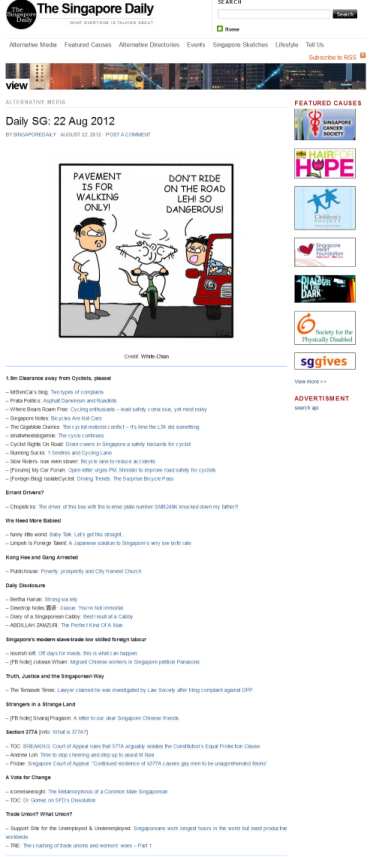
When cyclists discuss cycling problems, they usually talk about local issues. Traffic laws and local customs dominate the conversations.
Even on the Internet, where everyone has access to everyone else’s thoughts, people tend to write about cycling news from their area, either on a local, regional or national level. This doesn’t stop visitors from other parts of the world from commenting on what’s been said, although their voices are few and far between. The debate usually occurs among people from the area who are directly affected. This is really no surprise.
However, what is a surprise is that when cyclists are looking for cycling information, they don’t just confine themselves to material produced in their own country, they search the entire globe. On some level, this indicates an inherent understanding of the existence of common elements in cycling views and experiences.
How do I know this? My blog — a cycling specific blog — gets traffic from around the world. Visitors from a number of countries have also commented on this blog, so I know that they have an opinion about what they’ve read.
In my early days as a cycling blogger, I was amazed by receiving traffic from other countries. My blog is part of a local blogging community hosted by bostonbiker.org. I expected visits primarily from local cyclists and couldn’t imagine what had attracted people from other parts of the world to my humble blog.
To satisfy my curiosity, I looked for patterns in the visits. I thought that some of my content might be of particular interest to international visitors. What I found instead was a distribution of visits to various blog posts similar to the distribution of visits from U.S. visitors. The internationals seemed to be interested in the same content as their American counterparts.
This began a trend in my thinking about cycling as an experience in a modern world. Since most of us experience cycling locally, we fail to realize that cyclists half way across the globe are often experiencing the exact same things as we are.
Aggressive motorists, people who don’t want bicycles on the roads, and drivers who don’t yield to bicycles are common in many parts of the world. With the exception of places like Copenhagen, where cycling is considered as part of the design of roadways, most modern cities host driver versus cyclist conflicts — unintentionally, of course.
As these ideas began to crystallize, I noticed a strange occurrence on my blog. About a week ago, I started to get a lot of international traffic on a post which I wrote primarily with my local cycling brethren in mind.
I was talking about a new driving trend whereby drivers were passing bicycles on the right, instead of on the left, as they’re required to do by law. Another American cyclist commented that he had recently had an experience similar to the one I was writing about. It’s too early to know whether this passing on the right phenomenon is a trend, but as far as I know, it has appeared in at least two states.
A day or two after posting this piece, I decided to try to locate the source of the international traffic. Using my superior detective skills (otherwise known as a search engine) I found a link to my post on a foreign website, The Singapore Daily.

Are people in Singapore really so interested in drivers passing bicycles on the right? Apparently they are. While the author of the article linking to my post didn’t comment on what I had written, I did receive a lot of traffic. This made me think that the article’s author expected his or her readers to be able to relate to what I had written.
To take a break from all of this intellectualizing about how much in common cyclists from around the world had, I took a moment to reflect upon how my post was presented. Next to the name of the blog and title of the post it said “foreign blog.” I had to chuckle to myself since I hadn’t really thought of my blog that way. But, it was understandable as all of the other links were to cycling information from sites in Singapore.
Just reading the names of these cycling articles made me realize how much like our experiences their experiences were. And the cartoon they had posted at the top of the page showed a cyclist being trapped between and scolded by a pedestrian and a driver, both of whom told him that he should neither ride on the sidewalk or on the road. Sound familiar?
Many cyclists don’t like the idea of a cycling community. They want to be regarded as individuals. This is appropriate; they are individuals. Still, one cannot deny the fundamental experiences shared by everyone who rides a bike. Such experiences are universal. They transcend borders, languages, and cultures.
Next time I hear someone protesting that “there is no cycling community,” I am going to say: “Yes, but there are universal cycling experiences which bind all cyclists together, so we should embrace these commonalities and recognize them as the fabric that makes cycling a legitimate mode of transportation.”



